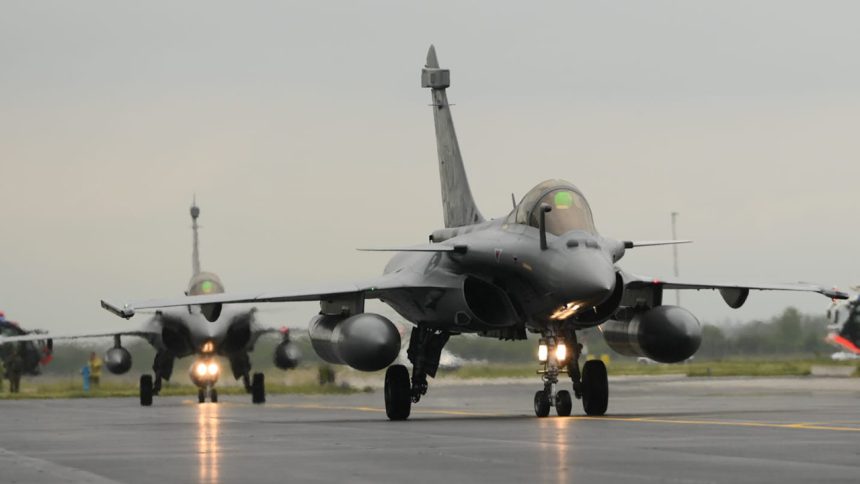The six Rafale multirole combat aircraft were welcomed at the Zagreb operational base by the President of the Republic of Croatia Zoran Milanović, the Prime Minister Andrej Plenković and the Minister of Defense Ivan Anušić.
After acquiring 12 Rafale aircraft from the French Air and Space Force in November 2021, the Croatian Air Force – Hrvatsko ratno zrakoplovstvo i protuzračna obrana (HRZ i PZO) – received the first six Rafale on Apr. 25, 2024, at the 91 operational base near Zagreb.
These aircraft were flown by Croatian pilots who underwent training in France and were welcomed during a ceremony attended by President Zoran Milanović, Prime Minister Andrej Plenković, and Defense Minister Ivan Anušić.
PVRH @AndrejPlenkovic na svečanosti prihvata prve skupine VBA #CRORafale u sastav HRZ-a: Danas je veliki dan za jačanje #HV, a posebno za one koji su u doba velikosrpske Miloševićeve agresije činili sve da obrane hrvatski teritorij i ostvare našu slobodu. @MORH_OSRH pic.twitter.com/ObV342R0P8
— Vlada Republike Hrvatske (@VladaRH) April 25, 2024
Nabavka #CRORafale znatno osnažuje i međunarodni položaj Hrvatske, kao i našu ulogu u okviru @NATO i EU. Posebno zahvaljujem pilotima Hrvatskog ratnog zrakoplovstva, kao i svima koji su proteklih 8 godina radili na ovom zahtjevnom projektu! Hrvatsko nebo dobilo je svoje čuvare! pic.twitter.com/V1pH7EuycU
— Vlada Republike Hrvatske (@VladaRH) April 25, 2024
The Rafale jets, that took off from the Dassault Aviation facility in Mérignac, will be integrated into the 191 Eskadrila Lovačkih Aviona (ELA) (191 Squadron) of the Croatian Air Force.
Hrvatsko nebo od danas čuva prvih 6 hrvatskih Rafala! Hrvatsko ratno zrakoplovstvo raspolaže snažnim borbenim avionima za obavljanje svih zadaća, a posebice odvraćanja i čuvanja sigurnosti naše Domovine što 🇭🇷 čini snažnijom unutar @NATO i na geopolitičkoj karti Europe. @VladaRH… pic.twitter.com/Zasjw1DuZq
— Ivan Anušić (@ivananusic12) April 25, 2024
Additional Rafale aircraft are expected to arrive starting from the end of 2024, aiming to establish a complete squadron by mid-2025.
“The successful delivery of these first Rafale aircraft by the Croatian Air Force highlights the skill and dedication of its pilots and personnel, underscoring Croatia’s strong partnership with France. Dassault Aviation remains committed to ensuring the full integration and logistical support of the Rafale in the Croatian Air Force, bolstering Croatia’s sovereignty and enhancing its operational capabilities within NATO,” stated Éric Trappier, Chairman and CEO of Dassault Aviation, in a public statement.
Povijesni dan za Hrvatsku! Prvih 6⃣ višenamjenskih borbenih aviona #CRORafale od danas čuvaju hrvatsko nebo. Sigurnost naše zemlje podignuta je na razinu na kojoj nikad prije nije bila. Ponosni smo radi realizacije najvećeg ulaganja u sposobnosti Hrvatske vojske.@MORH_OSRH pic.twitter.com/X06D2rO8U0
— Andrej Plenković (@AndrejPlenkovic) April 25, 2024
A group of 12 Croatian pilots commenced training on the Rafale at Saint-Dizier, with ground personnel and maintainers undergoing training at Mont-de-Marsan in 2023. According to the Croatian Ministry of Defense, Croatian pilots began conducting solo missions on the Rafale in May. Overall, France will provide training for approximately 80 Croatian personnel over an 18-month period.
Croatia is the last European operator of the MiG-21 Fishbed, with only a few of the 12 aircraft in service still operational. The acquisition of second-hand French Rafale jets will enable Croatia to replace its aging fleet of Soviet-era jets, marking the largest procurement program since Croatia gained independence from the former Yugoslavia.
The procurement
Croatia and France finalized a government-to-government agreement valued at 999 million Euro for the purchase of 12 second-hand Dassault Rafale aircraft during a ceremony in Zagreb on Nov. 25, 2021. The event was attended by French President Emmanuel Macron, Croatian Prime Minister Andrej Plenković, French Minister of the Armed Forces Florence Parly, Croatian Minister of Defense Mario Banozic, and Dassault Aviation CEO Eric Trappier.
Under the contract, Croatia would receive 10 single-seater and two twin-seater Rafales in the F3-R standard, with the initial six aircraft slated for delivery in 2024 and the remaining jets expected the following year.
The selection of the Rafale came after an international competition concluded on May 28, 2021, which pitted the French aircraft against contenders such as the Saab Gripen, F-16V Block 70/72, second-hand F-16s from Israel, and reportedly even second-hand Eurofighter Typhoons from Italy.
Previously, Croatia’s attempt to acquire 12 second-hand Israeli F-16C/Ds for 420 million Euro in 2019 was unsuccessful when the U.S. Congress vetoed the transfer, citing Third Party Transfer (TPT) guidelines that required the removal of all Israeli modifications from the aircraft. Subsequently, Croatia canceled the deal and initiated a new procurement process in 2020.









